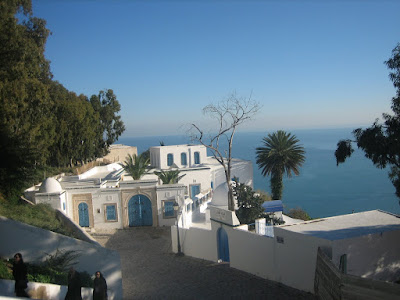This month I've been trying to finish watching online a Syrian mini-series called "Bab al-Harr" that played all throughout the Middle East and North Africa during this past Ramadan. It was played every night during the holiday, and it so captivated Jordanians that--in the words of a Jordanian friend of mine--when it was on you would "not find a person on the street." I too was captivated by it, with its portrayal of life and culture inside the old city walls of early 20th century Damascus, and I'm still watching it now because we left the country for a bit towards the end of Ramadan and I missed the last week or so of the show.
Much of the plot revolves around the family of a man called Abu Isaam, who--after a particularly nasty disagreement with his wife of many years--divorced her. Because of the cultural conditions of the time, this divorce set off a terrible chain reaction within the family, as the former wife was obliged to leave her home and move in with her brother, as--even if she had the means to do so--no honorable woman of the time would live by herself. Also, the father of the man who was engaged to the daughter of the divorced couple forced his son to call off the wedding, as no family of the time would want to be stained by the dishonor of divorce, even when just connected to a family being married into. The program skillfully depicts the social customs of the time, customs which are still in evidence today where we live. Yes, of course there are many differences between early 20th century Damascus and early 21st century Amman, and it is--as another Jordanian friend of mine said--"just TV." However, the overriding culture of honor and shame in which the requirements of the family are put first--as opposed (for better or worse) to the more individualistic nature of American society--remains the same. Also, it is possible to learn from a good book or a good movie, and even a good television show.
Something I ponder when I watch the show regards the male dominated nature of the society portrayed. Whenever anything controversial or important occurs on the screen, the men of the community all gather together to yell at each other, discuss or think about the problem at hand. Meanwhile, the women of the community sit around and wait for a decision or ruling to be made on an issue that may affect them, but on which they have no voice. Once a decision is made, the rest of the community must abide by it. This strikes me as simply a bad way to do life. To leave important discussions to one segment of society while excluding another segment of society from those discussions seems to me to not be the best way to make wise, informed decisions. Such an approach utilizes only part of the brain-power available in a community. Men and women are different, and sometimes have different ways of thinking, and leaving women out of a decision making process eliminates the possibility of hearing different attitudes and perspectives, and as a result short-circuits any potentially more creative solutions to a given problem.
This approach to problem solving is still noticeable in Jordanian society, and some women we know have lives that aren't as full as they could be because of decisions made for them by men in their lives. I also think, though, that it has by no means disappeared from my own American society. For instance, I see this still taking place in our current presidential election season, as some say that a woman--irrespective of her qualifications are lack thereof--should not be elected to the office of president. I also see this especially still taking place in the church, where women are still not welcomed into pastoral roles in many denominations and often shut out of various decision making processes, and are often told to be subordinate in their families.
But just like in the male only arena of Bab al-Harr, this strikes me as a bad way to do life. For a church to be lead only by a group of people from one segment of society, and for a family to rely on the man to lead and the woman to follow seems to me to not be the best way to make wise, informed decisions that are for the benefit and encouragement of all. The church--like society--consists of both men and women, and as such should be lead by both men and women. A family should rely on the leadership of both of the people who--in the words of the author of Genesis--"united" to "become one flesh." Shutting women out simply because they are women--regardless of their ability to lead or provide a different perspective or creative outlook on a certain situation--seems to shut out the possibility of obtaining the best solution to a problem or situation for growth. So many times in Bab al-Harr what the men decide for the group ends up causing pain or more trouble. Yes, it is just TV, but it does mirror what actually happens in Jordanian society and even, to some extent, what happens in American society. I think a complete inclusion of those still not entirely allowed to be part of decision making processes--while not ultimately bringing about perfect solutions or situations--will create a situation where better, more equitable and more human decisions are possible.















 Matt sitting under the tent.
Matt sitting under the tent.

































